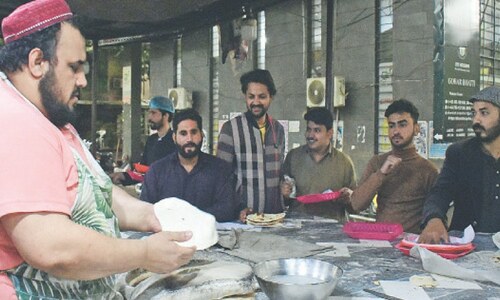
Q. What are you currently reading?
A: I’m reading the autobiography of Jam Saqi, which is compiled by my colleague Ahmad Salim and Nuzhat Abbas. It’s a beautiful book, which tells the story of a revolutionary leader who has been working for the rights of people and peasants, and is known as a symbol of resilience in Sindh, who stood against the military dictators of his time.
He was often sent to prison and lost his family; it’s a really inspiring book that tells you a lot about the people who were aligned with the leftist movement at the time, what motivation they had behind their ideologies, their actions, why they believed in what they believed etc.
Of course, Jam Saqi is still living in Karachi; [he] also contested an election. The book described how otherwise popular ‘national leaders’ couldn’t do well in the elections.
I’m also reading a book by John Nash on game theory, [which is] a theory about economics. John Nash is considered to be the founder of game theory. And game theory can be applied not only in pure economics but also day-to-day life.
Q. Do you prefer to read fiction or non-fiction?
A: Usually, when I’m in a transit lounge, it’s fiction that attracts me most. Especially when there is a long layover between flights; five or six hours. At that time, one doesn’t intend to read heavy things. I just go to any of the bookshops in the airport lounge. I do a lot of my reading when I travel.
Q. Are there any classics that you weren’t able to get through?
A: I think it’s not about the book, it’s about the state of mind. You can pick the best of the best books, the bestsellers, and if one is not in the proper mindset, even that book would be quite boring and would feel quite heavy. When one is in the state of reading, then I don’t find any book that is too heavy or that is too difficult to absorb.
Q. Are there any books or authors you find yourself returning to?
A: Stephen Covey is one author I feel like reading again and again. Then there are classics like The Prince by Machiavelli, some of the writings of Ghulam Mohammad Pervaiz, who wrote on religions and tried to do some scientific narration of Islam.
In Urdu literature, Mumtaz Mufti is my favourite. When I have free time, I usually pick up Ali Pur Ka Aeeli and go through it. Then, again in Urdu, Shahabnama – I feel like reading that again and again.
And Siddique Salik is my all-time favourite when it comes to lighter reading... he [writes about] societal issues, but in a humorous way without letting the reader realise that he’s actually touching upon some hard realities about society.
Q. Are there any works or writers you feel are underrated?
A: Some of the work being done by Ahmad Salim, a famous Punjabi poet and a historian, who has written a lot in Urdu as well, I feel, is underrated.
He is the author of more than 300 books, a recipient of a pride of performance for literature and [he received an] award for non-Bangladeshis who helped the Bangladesh movement. He’s one of those people who are perhaps not as widely read as they should have been.
Q. What are you planning to read next?
A: Every time I travel abroad I bring a bag full of books, which I keep for my pastime reading. Even now, I have quite a few books.
One is called Jugaad Management, and it is by Harvard professors. It’s mainly on India, but Pakistan and Bangladesh can very easily correlate with the book.
At the Harvard Business School, they’re trying to understand jugaad management, and they’re trying to understand why business theories do not work in countries like India, Pakistan and Bangladesh, and how this thing called jugaad can make things happen. It’s quite a voluminous book, and I was quite intrigued by the sight. It is about the art of doing things, and how you can use whatever sources you have to try to achieve your goals.
The next two books on my reading list are Orientalism by Edward Said and The Autobiography of Malcolm X.
Published in Dawn, June 29th, 2017














































Dear visitor, the comments section is undergoing an overhaul and will return soon.